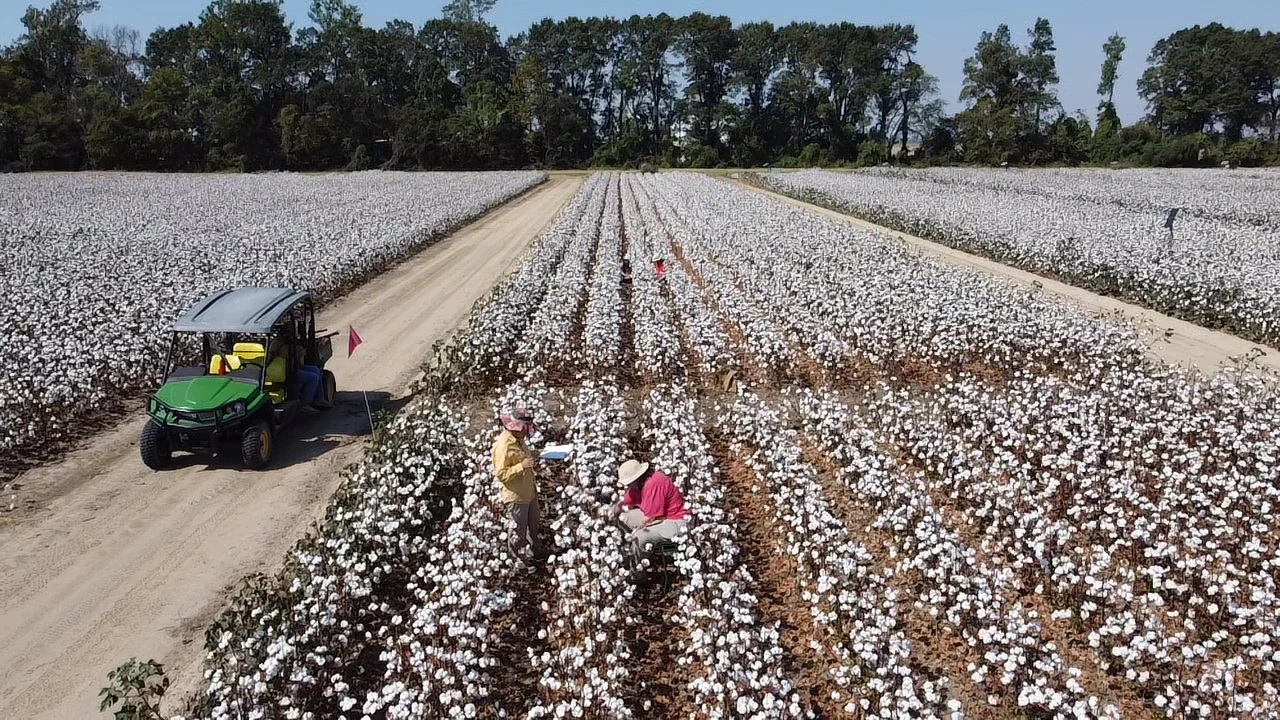Researchers Receive Grant to Monitor Water Quality and Green House Gas Emissions
Dr. Tina Gray Teague and Jennifer Hinojosa, program tech, are shown mapping bolls on cotton plants just prior to harvest at the Judd Hill Plantation research plots in Poinsett County. Photo credit: Mitchell Price, A-State student.
JONESBORO – Arkansas row crop farmers have made extraordinary progress since the 1990s expanding their adoption of best management practices to improve soil and water conservation.
Dr. Tina Gray Teague and Dr. Ray Benson from the College of Agriculture at Arkansas State University work along with Dr. Michele Reba, research hydrologist with USDA-Agricultural Research Service Delta Water Management Research Unit (DWMRU), to document those improvements with field-scale research and demonstration work on farms in Northeast Arkansas.
Best management practices include reduced tillage, use of winter cover crops, and improved irrigation water management.
Teague, professor of entomology and plant science, spent decades studying interactions of plants and insects in cotton with an eye toward sustainability. Her research emphasis shifted in the early 2000s to focus on expanding on-farm implementation of winter cover crops.
“These investigators are leading the way on important research that directly aids cotton producers across the Delta region,” commented Dr. Mickey LaTour, dean of the College of Agriculture.
Teague received funding in 2010 from the U.S. Department of Agriculture Natural Resource Conservation Service (NRCS) in support of the Mississippi River Health Water Initiative to document how crop production practices, including cover crops, impacted surface water quality of run-off from commercial agriculture fields.
She began a long-term collaboration with Reba, lead scientist and acting research leader for DWMRU, to establish edge-of-field water quality monitoring programs in cotton, soybeans and rice systems with producers in Mississippi, Craighead and Poinsett Counties. Their on-farm projects now include agronomist Benson, assistant professor of plant and soil science and R.E.L. Wilson Chair in Agriculture at A-State.
“The over-arching goal of this work is to improve the Mississippi River Basin environment by providing technology assistance to farmers and their advisers that encourages expanded adoption of best management practices, including irrigation water management, winter cover crops, reduced tillage and field border management,” according to Teague.
Teague is currently project director of a new USDA-NRCS Arkansas Technical Assistance grant to continue and expand that work, which includes monitoring greenhouse gas emissions. She also holds a joint appointment from the University of Arkansas System Division of Agriculture – Agricultural Experiment Station, which secured the federal grant to support the work.
The researchers received $939,127 through NRCS. Non-federal matching funds total more than $800,000.
“The project should provide valuable technical information for stakeholders and service providers for use in future conservation planning activities and implementation opportunities in Arkansas and the Mississippi River Basin region,” Teague added.
“Producers will directly benefit from this project by developing a better understanding of how different conservation practices impact crop yields. Information from field-integrated measurements of greenhouse gas (GHG) emissions in irrigated cropping systems has potential to contribute to the developing carbon credit market for east Arkansas crops.”

